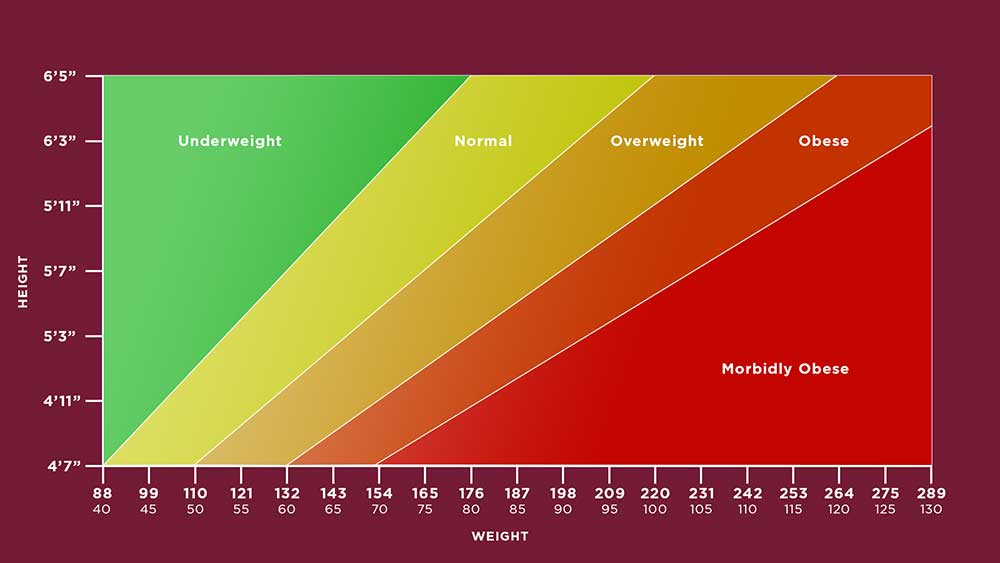Providing you resources every step of the way.
Am I a candidate?
Your body mass index (BMI) is the ratio of your weight to your height and can help indicate your risk of obesity. BMI is not a perfect calculation but most insurance companies use this number to help determine if you will be approved for surgery.
You may be a candidate for bariatric surgery if you have a BMI greater than or equal to 35 with one or more other illnesses associated with metabolic syndrome, such as:
- High blood pressure
- Diabetes
- Sleep apnea
- High cholesterol
- Infertility
If you have a BMI greater than or equal to 40, you may be considered a candidate regardless of the presence of any other medical condition.
Calculate your BMI
Using the calculator, input your height and weight and click "Calculate BMI". The number that appears is your estimated body mass index number.
BMI categories
Underweight = <18.5
Normal weight = 18.5–24.9
Overweight = 25–29.9
Obesity = BMI of 30 or greater
Using the table below, you can see your health classification and potential health risk by using your height and weight. Typically, if a person falls within the "Obese" or "Morbidly Obese" sections, their eligibility for surgery is greater than a person that simply falls in the "Overweight" category.


Still Have Questions? Request a Consultation
Your Patient Journey
Each step in the bariatric surgery process is important and the length of each patient's journey may be different, depending on your unique medical history. Our team won't rush you in and out of our doors - this program is about you and you should be as comfortable as possible as you move forward.
Typically, each patient will follow a six-month workup timeline, from initial consultation to the day of surgery. For each patient, however, the journey can be broken into five simple steps:
Education is KEY!
Learn as much as you can about bariatric and metabolic surgery. You can watch our online seminar video to meet our team of surgeons, learn about the benefits of surgery and review the types of procedures we offer.
As you're learning, be sure to research:
Which surgical options are available
What are the risks and benefits of each procedure
How were others' experiences
Will your insurance cover the surgery
You can also attend one of our free support groups online to connect with other patients on different parts of the journey and ask questions.
Now it's time to have "the talk."
Talking with one of our doctors will help you determine if you're a candidate for surgery and which option is best, depending on what your specific health issues and goals are.
It's time to conquer the climb!
The pre-surgical process begins once you've talked with your doctor and he or she agrees you are a candidate for weight loss surgery. As you start this process, before you undergo any procedure, you'll be required to go through a series of:
Educational classes on nutrition and lifestyle changes
Conversations with a therapist
Once you've completed your pre-operative requirements, you'll meet with your surgeon again who will submit your request for surgery to your insurance company for authorization.
Your procedure will be life-changing so you'll need to prepare.
In the weeks leading up to surgery, prepare yourself physically, mentally and emotionally for the journey you are about to begin. Some ways you can be prepared include:
- Lose as much weight on your own as you can
- Develop healthy, new eating habits
- Start exercising
- Join a peer support group
- Keep a diary of your thoughts and feelings
- Get your friends and family involved in the process
- Track your diet and exercise with the Baritastic app
The more support you have at the beginning of this journey will help you tremendously in the end.
What to expect after bariatric surgery
Undergoing bariatric surgery can bring major changes to your life, including rapid weight loss and a healthier, slimmer body. After weight-loss surgery, many of our patients feel better and are able to reduce (or completely eliminate) the side effects of obesity-related diseases.
The real work for our patients, however, begins after surgery ends, and we provide guidelines for each patient to follow, tailored to their specific case. We'll also provide education and guidance before, during and after your surgery and work with each patient to make sure they're prepared for the changes that lie ahead.
Going home after surgery
While each patient is different and recovery will vary based on the individual, the typical patient is able to go home within 24-36 hours after their procedure. In some cases, we may ask patients to stay longer so we can continue to monitor their progress more closely. If asked to stay, each of our patient suites can accommodate one family member overnight.
Your daily routine after surgery
Life after surgery will vary by person and success is truly dependent on how closely you follow your recommended after care program. Many aspects of your daily routine may vary, but below are some of the more typical cases and answers to questions we normally receive. For more information about other aspects of your daily routine not discussed below, please call our office and talk with one of our new patient liaisons at (559) 433-6010.

Online Seminar
To take the first step on your bariatric journey, you’ll need to watch this video and submit the short quiz. The online seminar video will introduce you to our team of physicians and provide more in-depth information about the services our program offers.
Watch Seminar
Seminar quiz
After you’ve finished watching the online seminar video, you’ll need to complete the bariatric seminar quiz in order to move forward on your journey. The quiz will ask a few simple questions referenced in the video and will also ask you to fill out a few screening questions about your health history.
Bariatric Patient Liaisons
Once you successfully complete the quiz, you’ll be contacted by one of our Bariatric Patient Liaisons with more information. If you have any additional questions after you’ve submitted your quiz, you can talk with your personally assigned liaison at any time.

Support Groups
To continue to keep us all as healthy as possible as our community continues to deal with the novel coronavirus (COVID-19), we’ve moved some of our support groups to Zoom. You can read about all of our groups below and see when each group is available by downloading our schedule below.
Patient Focused Support Groups
- Exercise & Nutrition (1st Wednesday of each month)
- Q&A with Our Team (2nd Wednesday of each month)
- Well-Being (3rd Wednesday of each month)
- Chair Yoga (4th Wednesday of each month)
Educational Videos
There is certain information you need to know at specific points in your weight loss journey. Both before and after your bariatric surgery, you'll have questions about everything from setting weight loss expectations to how to prevent weight re-gain. Check out our video library for answers to these questions and more.
Weight Management Class Documents
Throughout your bariatric journey, you’ll be required to take various weight management classes designed to help you navigate through the weight loss you’ll experience after your surgery. Currently, classes are being offered online and our staff will assist you in getting access to these classes at the appropriate time. You’ll need to access the documents below for specific weight management classes. Please click on these link(s) to download the appropriate document(s), as instructed by your class leader.
Bariatric-Friendly Recipes
From mental health to diet and exercise, our program provides resources to keep you on track as you continue down your bariatric journey after you leave the hospital. Our team of registered dietitians have sourced and developed various bariatric-friendly recipes that you can download, print and prepare for your next meal. Please note that every patient’s health is different — the recipes provided on this page may not be suitable or appropriate for your specific dietary needs. Please consult with your doctor or medical team to ensure you follow nutritional guidelines appropriate to your specific health journey.
Bariatric Nutrition Guide
This guide will help you learn the ins and outs of bariatric procedures, dietary restrictions, menu planning and guidance for every step of the way.
Guía de Nutrición Bariátrica
Para nuestros pacientes que hablen español, esta guía les ofrecen información sobre la cirugía metabólica y bariátrica.

Financing Options
If you're planning to apply for coverage under your insurance plan, most insurance companies will pay for all or part of your surgery if we show a documented need for the procedure.
Generally, this can be achieved by:
- Completing pre-surgical assessments and evaluations with your primary care physician
- Supplying documentation of previous attempts to manage your weight through non-surgical methods (i.e., diet and exercise)
- Providing proof that you are ready to undergo bariatric surgery
Some insurance companies will also require documentation that you also have another health condition related to obesity such as:
- Type 2 Diabetes
- Arthritis
- High Cholesterol
- Hypertension (high blood pressure)
- Sleep Apnea
If you do not have insurance coverage or you require supplemental financing for co-payments, please call our office and one of our new patient liaisons can assist you.
Frequently Asked Questions
Bariatric surgery, also known as weight-loss surgery, is a broad description for a number of procedures designed to help morbidly obese patients lose weight in order to regain health, improve their appearance and boost self-esteem.
Generally, patients who are at least 100 pounds overweight and have a body mass index (BMI) over 40 are said to have "morbid obesity."
Many life-threatening illnesses, also known as co-morbidities, are associated with obesity. The most notable illnesses include:
- Type 2 Diabetes
- Heart disease
- High blood pressure
- High cholesterol
- Sleep apnea
Typically, those with a higher body mass index are candidates for bariatric surgery.
You may be a candidate for surgery if:
Your BMI is 35 or greater and you have been diagnosed with another life-threatening illness such as type 2 diabetes, high blood pressure, high cholesterol or sleep apnea
Your BMI is greater than 40 with no other diagnosed illness
If you have any questions about candidacy, you can call our office at (559) 433-6010.
The answer here is "it depends."
Most insurance companies will pay for all or part of the surgery if you show a documented need for the procedure. Our support staff will be happy to work with you and your insurance company throughout the approval process.
Most insurances require that surgery be done at an accredited program. Fresno Heart & Surgical Hospital is accredited under the Metabolic and Bariatric Surgery Accreditation and Quality Improvement Program (MBSAQIP).
Our program offers both surgical and endoscopic (non-surgical) options.
Surgical options include:
Our endoscopic options include:
Endoluminal gastric plication (or, "gastric sleeve")
While we are familiar with the gastric balloon, our program does not perform that specific procedure. We encourage patients that are interested in the balloon to consider the endoluminal gastric plication as it is a proven safer and more effective option for our patients.
Our team offers various revision surgeries for patients as well and will discuss, as requested.
Every patient is different and results will vary. Typically, patients will lose at least 50% of their excess body weight after their procedure - some patients may lose 70-80%.
Drastic weight loss is normal for the first 12 months after surgery, and then gradually tapers off.
Achieving a healthy weight can reduce or completely eliminate the illnesses associated with obesity. Bariatric surgery can also increase self-esteem, improve general appearance and give patients newfound abilities to participate in everyday life.
Like any procedure, there are risks associated with surgery. However the mortality rate is less than one percent and is considered safer than child birth or having your gallbladder removed.
Your surgeon will discuss additional potential risks with you well in advance, depending on your specific health history.
Our surgeons use minimally invasive or laparoscopic techniques whenever possible. This means shorter recovery times and less pain for our patients. Most patients are up and around on the afternoon of their surgery and are discharged in a day or two.

